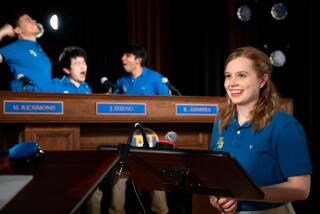The Math Media
- Share via
GLENDALE — Sid Kolpas, an assistant professor of mathematics at Glendale Community College, confesses to having some unusual role models for his work in the classroom.
At noon Tuesday, as part of the college’s free Science Lecture Series, he’ll be revealing who they are to the public. The title of his lecture, “Math in the Movies,” is a hint.
But several decades worth of San Fernando Valley-area math students already know Kolpas’ quotes from certain cartoon characters and musical-comedy stars--and have responded by doing better schoolwork than those in other teachers’ classes.
According to Kolpas’ boss, math department Chairman Steve Marsden, “The percentage who do ‘passing’ work is 60% in other classes. In Sid’s, it’s 75% and higher.”
Kolpas, a teacher for 25 years, comes equipped with a master’s degree from CSUN and a doctorate from USC. “Sometimes I feel like Donald Duck,” he reveals, “imbued with the spirit of mathematics as he was in ‘Donald in Mathmagic Land.’ ”
Kolpas, 50, also confesses to being “a huge fan” of Danny Kaye, who portrayed a math teacher in a 1958 musical, “Merry Andrew.”
“He sings and dances an explanation of the Pythagorean Theorem--accurately,” says Kolpas. “I bring the clip into class on days when it fits into what we’re covering.”
Last week, he found his own way to use dance to teach the concept of vertical asymptotes behavior in a business calculus class. Kolpas reports that one of his students came up after the session and said, “My god, you connect this stuff to everything--and it sure helps to stick in my mind.”
Kolpas’ viewpoint is that a good math teacher has lots of connections, such as literature and history. “Math,” he says, “is not an island.”
So on Tuesday, he will unreel more than a dozen such connections in the form of movie clips going back 60 years.
“Often, films brilliantly explain difficult mathematical concepts, the frustrations of mathematicians and math teachers, and the mystery and magic of mathematics,” Kolpas says.
He plans to cite Donald and Danny, Jodie Foster in “Contact,” Dustin Hoffman in “Straw Dogs,” and of course, Edward James Olmos in “Stand and Deliver.”
No prude, he even cites the scene in “IQ” in which Meg Ryan launches into an explanation of the concept of limits and convergences as a means of seducing Tim Robbins.
Some negative math lessons come out of Hollywood, too. When the scarecrow in “The Wizard of Oz” finally gets a brain installed, Kolpas reports ruefully, “he still can’t recite the Pythagorean Theorem correctly.”
In addition, Kolpas says the Barbra Streisand opus “The Mirror Has Two Faces” all too accurately portrays “the sorry state of college mathematics teaching--boring and passionless.”
This particular professor, however, is anything but passionless about one famous pop-culture reference to his field. In 1991, Mattel marketed Teen Talk Barbie, who recited such phrases as: “Party dresses are fun!” “Do you have a crush on anyone?” and “Math class is tough!”
The last remark sparked an outcry from the National Organization for Women, and the product was recalled.
But Kolpas, after considerable effort, obtained one of the dolls to use in class. Why?
“Women have been brainwashed on the subject of math for years. Until the 1700s it was forbidden for them to study math. I want to motivate them. I even teach a Math Anxiety class where the majority are women.”
Does Barbie--or Meg or Jodie--do anything for these students?
“I love the way he teaches,” says Julie Salazar, who is majoring in computer science and business administration. “He makes math really interesting. He’s kind of a math freak [and] tends to joke a lot. The Barbie thing was really funny.”
She also reports something that indicates that times have changed since the 1700s.
“In my math classes now, 70% of the students are women. And, citing Kolpas as her inspiration, “Now I tutor other students on campus.”
More to Read
Sign up for Essential California
The most important California stories and recommendations in your inbox every morning.
You may occasionally receive promotional content from the Los Angeles Times.













